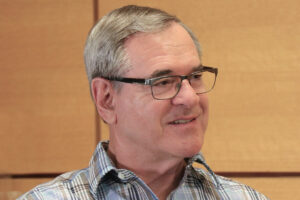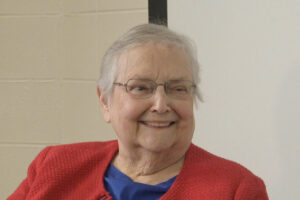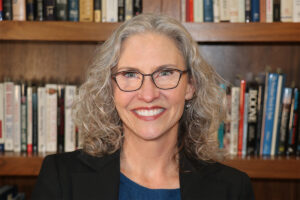Topic: Sierra Club

Interview of David Pope, September 19, 2019
Interviewed by Rex Buchanan
In this 2019 oral history interview, David Pope describes how the awareness of declining water levels in the High Plains Aquifers in Kansas led to efforts to support wise use and responsible management of groundwater in the state. He describes being hired to address groundwater issues from the local perspective and how he was involved in the creation the Groundwater Management District (GMD) in southwest Kansas. As Assistant Chief Engineer of the Department of Agriculture’s Division of Water Resources and later Chief Engineer, Pope was involved in a state policy limiting new groundwater development, referred to as planned Show Moredepletion, along with efforts to develop regulations on water management to replace the prior ad hoc approach. Pope discusses his dealings the U.S. Army Corps of Engineers in assuring minimal desirable streamflow to satisfy municipal and industrial water users along with conservation and recreation interests. He describes the complex interplay of surface and groundwater use policies which became a politically highly charged issue in addressing the Cheyenne Bottoms wetlands issue, Pope explains how the water law premise of "first in time, first in right" has been modified with amendments and regulations that require the filing of water rights, development of conservation plans to assure the beneficial use of water, mandatory metering of water use, and closure of areas for new water rights, all based on hydrologic studies. He concludes that although some GMDs have not tackled long-term depletion problems in western Kansas, two districts have adopted successful strategies: safe yield rules adopted by Groundwater Management District No. 2, and the creation of the Local Enhanced Management Area (LEMA) in Sheridan County to regulate irrigation. Pope describes those successes and speculates on why others have not been as successful. Show Less

Interview of Joyce Wolf, November 15, 2019
Interviewed by Rex Buchanan
During her 2019 oral history interview, Joyce Wolf talks about her background working with environmental organizations on a variety of environmental issues. With a degree in bacteriology, she became interested in water quality issues before the creation of the U.S. Environmental Protection Agency (EPA). Wolf worked with Jan Garton, a key figure in environmental advocacy in Kansas, and a coalition of environmental groups supporting water rights for the Cheyenne Bottoms wetland area under the banner of “Save Our Bottoms.” Wolf was also involved in debates over the low-level radioactive waste disposal facilities. She elaborates in this interview on the Show Moresuccess of the coalition achieving an arrangement for adequate water supply for Cheyenne Bottoms and funding of the State Water Plan during the administration of Gov. Mike Hayden. Wolf recalls that environmental organizations were also concerned about the silting-in of the federal reservoirs, the decline of the Ogallala aquifer, the conflict over the Arkansas River that led to the Kansas v. Colorado lawsuit, and the loss of surface water in western Kansas. Wolf also discusses the cultural differences between Kansas and Minnesota that appears to reflect a lack of appreciation of the natural environment in Kansas. Show Less

Interview of Nancy Jackson, November 9, 2023
Interviewed by Rex Buchanan
Nancy Jackson, founder and director of the Climate + Energy Project (CEP) from 2007 to 2010, recalls being challenged by the founder of the Land Institute on her approach to finding workable solutions to climate change. Jackson held that alternatives should be found to meet the needs of western Kansans for energy, good jobs, and a sustainable economy. Based on that challenge she started the CEP through the generosity of many experts in Kansas and across the country. Those initial years of the CEP were significant, and the project's impact was unexpected. In this Show Moreinterview Jackson discusses that impact and the importance of meeting people where they are in order to find solutions to difficult public policy issues. Show Less
